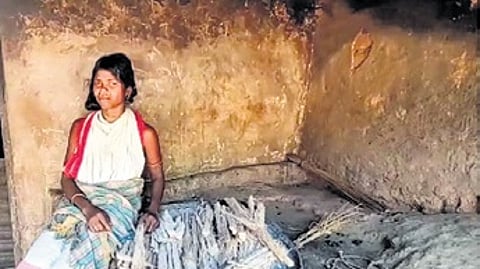

BERHAMPUR: As the mango kernel deaths in Kandhamal district continue to trigger political debate, not far away in Rayagada, similar consumption practices in the absence of adequate availability of foodgrains continue under the radar.
Tribals of the district, mostly Dongrias residing in Niyamgiri hill, consume gruel made of tamarind seeds and the stem (centrepiece) of the ‘Salap’ tree (Caryata urens). Says Sonali Nissaka (25), a Dongria woman of Niyamgiri Hill, consumption of gruel made of different seeds and stems is not a choice but a compulsion for her and others from her community.
The Dongrias, she said, used to subsist on forest produce and shifting cultivation while a few also work as daily wage labourers. However, now the forest produce has dwindled and shifting cultivation ended. With no work back home, members of the particularly vulnerable tribal group (PVTG) are migrating to other states.
Social worker Bijay Das said the government, be it Central or state spend crores of rupees on welfare schemes of PVTGs, but condition of the PVTGs has not improved which forces them to depend on inedible
“There is no work available. We somehow manage with the PDS rice. Our lean period is from August to November. During this phase, work is not available due to rains and people have no money to buy rice once the PDS stock runs out”, he said. In a bid to tide over such crisis, the tribals take to gruel made of seeds, he added.
Kalamu Kadraka (60) of Kurli village, one of the 120 villages on Niyamgiri hill, said PDS rice is distributed among the beneficiaries once every two or three months in the area. “Every beneficiary is given five kg rice per month. Is it enough for even two square meals?” Kalamu questioned.
This deprivation, the tribals say, prompts Dongrias to collect stems of Salap from the forest. They dry the stems and grind it properly. The powder is then put in an earthen pot to which water is added to make the gruel. Dr S Padhy who was posted in the area as a medical officer said, Salap stems are inedible and may cause stomach disorder and diarrhoea. The Dongrias were made aware of it but the practice continues, he said.
However, sarpanch of Kurli panchayat Subardini Wadaka denied consumption of gruel made of Salap stems directly. He claimed the powder is a nutrient and is mixed with food like rice, maize and millet. He, however, kept mum on execution of welfare schemes and employment opportunities in the area.
An official of Kalyansingpur block, on condition of anonymity, said the state government releases funds for executing welfare schemes on time but the utilisation leaves a lot to be desired. Consumption of gruel and water from springs is common among villagers of Niyamgiri but the administration has always presented a rosy picture of the area and its inhabitants.
Since 2016, the officer said, Rs 66.24 crore has been spent by Dongria Kondh Development Authority on welfare schemes in the villages but the tribals still live in penury. Two decades, Rayagada too had witnessed deaths due to consumption of mango kernel gruel. Though, no such incident has been reported from the district of late, gruel made of Salap stem poses a grave risk for the Dongrias, the official added.